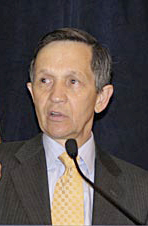Elizabeth Hartline Green
Where do the candidates stand on education? Dennis Kucinich on education.
 This is the sixth installment in an ongoing series on where the candidates stand on education.
This is the sixth installment in an ongoing series on where the candidates stand on education.
Today’s lucky contestant is Rep. Dennis Kucinich.
Kucinich’s overarching educational theory is that expanded access to education is the most important educational reform. Under that umbrella exist many related proposals.
First of all, Kucinich has proposed instituting universal, free, voluntary preschool for children aged 3 to 5. He put forward a bill in two different sessions of Congress; neither advanced. He also has proposed tripling the funding to the Head Start program, expanding access to Head Start, and making all Head Start programs full-day (currently centers can have either half- or full-day sessions; most have half-day programs due to funding restraints). Like the universal preschool bill, this proposal has not found success in Congress (despite the benefits that some states have found universal preschool programs to have).
For elementary and secondary students, Kucinich proposed mandating class sizes of less than 18 for grades 1-3 and increasing funding for the Individuals with Disabilities Act compliance (which prohibits discrimination based on disability in schools, among other things). Neither bill passed. He co-sponsored a successful bill providing money to schools for capital improvements and expansions, and has voted repeatedly against vouchers and school prayer bills.
Kucinich’s most interesting educational stance is his position on No Child Left Behind. He voted to instate the Act, but has come out against it since, stating that it puts too much of an emphasis on test-taking and that he would throw it out. However, he has said that he believes that funding under the Elementary and Secondary Education Act needs to be increased—the two are actually the same thing (NCLB just being a catchy name for the bill). It is possible that what Kucinich believes is that the test taking portions of NCLB should be changed, and overall funding for education should be increased; this has not been extrapolated.
Kucinich also supports providing free higher education at state colleges and universities, as well as increasing access to education and job training for recipients of welfare.
Kucinich does not focus on charter schools, and it is unclear whether or not he supports them. He also does not speak on teacher quality, though he would like increases in teacher pay across the board. This may be an oversight on his part, or he may believe that the problems to the education system lie mainly in lack of funding (as almost all of his proposals call for increased funding).
Kucinich claims that all of his funding increases will be balanced by cuts to defense spending. Regardless, it seems unlikely that the proposals that he has put forward unsuccessfully in Congress would gain more traction were he elected president. Though the amount of money Kucinich proposes to spend on education would very likely increase quality in some way, budgets so large (or cutting defense spending 15% and eliminating Star Wars programs) do not seem likely to find enough support among members of Congress to enact such legislation.
Elizabeth Hartline Green: Author Bio | Other Posts
Posted at 8:33 AM, Aug 21, 2007 in
Candidates on Education | Education
Permalink | Email to Friend










